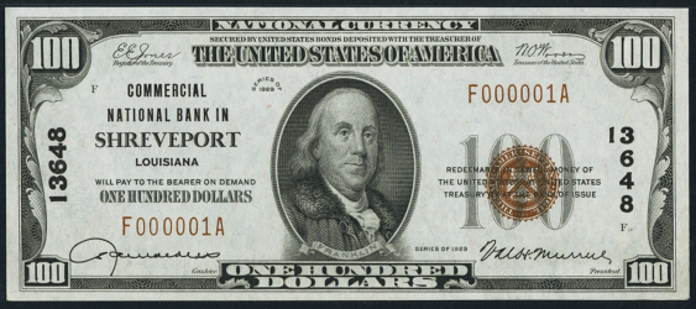One Hundred Dollar Notes › Nationals › 1929 One Hundred Dollar National Bank Notes › Nebraska Charters › 1929 $100 South Omaha Nebraska Union Stock Yards National Bank
Get Value Now
| Item | Info |
|---|---|
| Series | 1929 |
| Charter | #4632 Union Stock Yards National Bank of South Omaha, Nebraska |
| Year Chartered | 1891, 179 Banks Chartered |
| City Info | South Omaha is a former city and current district of Omaha, Nebraska, United States. During its initial development phase the town's nickname was "The Magic City" because of the seemingly overnight growth, due to the rapid development of the Union Stockyards. Annexed by the City of Omaha in 1915, the community has numerous historical landmarks many are within the South Omaha Main Street Historic District. Source: Wikipedia |
| Similar Cities | If your note doesn't match try: 1. South Omaha, Nebraska - South Omaha National Bank 2. South Omaha, Nebraska - Packers' National Bank 3. South Omaha, Nebraska - Live Stock National Bank 4. South Omaha, Nebraska - Stock Yards National Bank |
| Seal Varieties | Small Brown |
| See Also | If your note doesn't match try: 1. 1929 $100 Federal Reserve Bank Note 2. 1928 $100 Federal Reserve Note 3. 1928A $100 Federal Reserve Note 4. 1934 $100 Federal Reserve Note 5. 1934A $100 Federal Reserve Note 6. 1934B $100 Federal Reserve Note |
| Other Info | 1. Value depends on notes known for charter, condition and market demand. |
| Neat Fact | Check your note's serial number. Serial #1 notes are valuable, even on common charters. Serial numbers 2-4 are also desirable in some cases. |
No Obligations Offers and Appraisals
Please submit a good photo or scan. It will be identified and evaluated. Understand there may be subtle differences between the image you see above and your note. Signatures, design, markings and note condition will determine the offer price. Notes in Uncirculated or better condition receive the best offers.
Appraisals can be estimated for wholesale and retail prices. Wholesale is what dealers typically pay. Retail is what a collector might pay. Retail is slightly higher in most cases.
Please visit this page for USA Paper Money Reference. Do not treat this page as a reference guide, it is for appraisal and acquisition purposes only.
